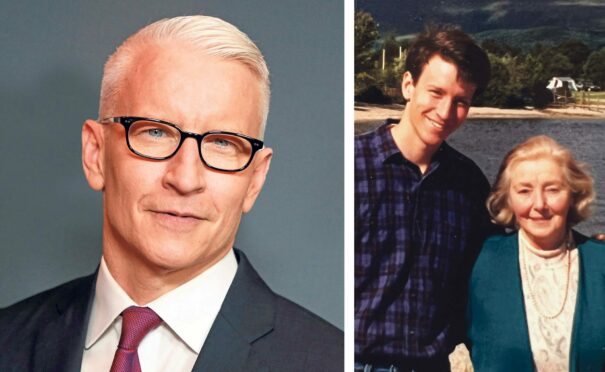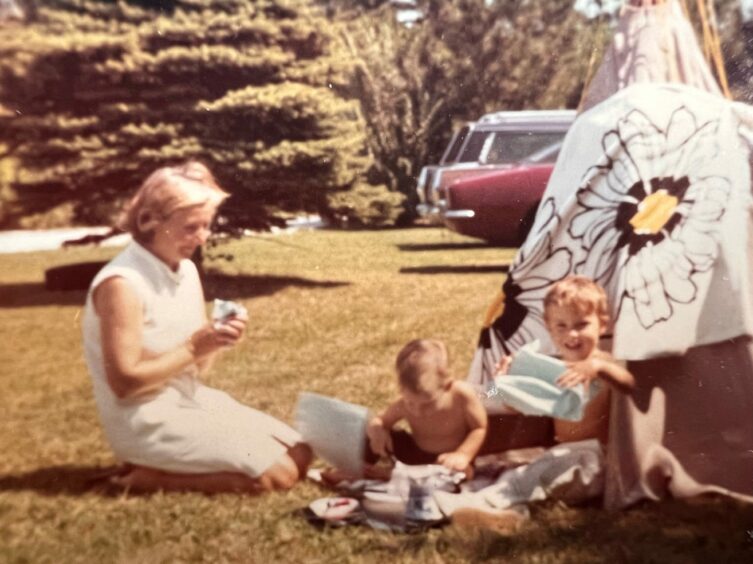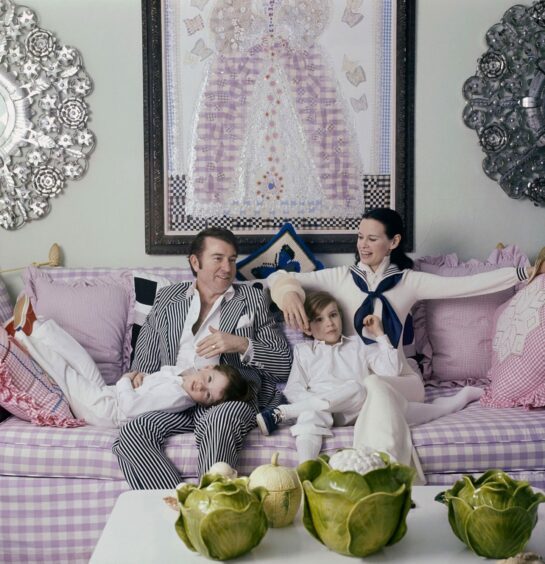
Anderson Cooper does not usually stumble over his words. As one of the most recognisable broadcasters in America, the CNN journalist has, with his hallmark combination of charm and steel, interrogated princes, prime ministers and presidents.
Yet, in the back of a car on a California highway, in a break from an investigation for 60 Minutes, the country’s highest-rated news programme, he seems to choke just a little.
“It’s still hard to talk about May because there is still so much pain associated with her. The sadness she had to leave us, and the hurt I felt is still very painful to even contemplate,” he says.
For Cooper, 55, scion of the Vanderbilt family, once the wealthiest in America, and heavyweight interviewer, the feelings are still raw. The woman in question is his late nanny, the irrepressible May McLinden, who Cooper loved, and who he feels was taken away from him by his mother.
Originally from Bothwell, Lanarkshire, McLinden became the family nanny for the famed Vanderbilt family five decades ago, helping raise young Cooper through a difficult childhood. She was the steady, consistent parental figure through tough times, including the death of his father in 1978 following a heart attack.
She would, he recalls fondly, gently call the shy young Cooper “skinnymalink” as she coaxed him out of his shell; it’s a term of affection he now uses for his own infant sons.
“May loved being in places where exciting things were, where people were, where young people were, where there was energy,” says Cooper. “She took pleasure in that activity in the world around her.
“She was a little hard of hearing but it made her very attentive to everything around her and I felt so comfortable talking to her about anything. She was all about caring for my brother and I, and wanted us to be engaged in the world.
“I was kind of shy and didn’t want to go to children’s parties, and she would always sort of want me to do things and get out and embrace the world. She had no patience for my boredom. She would say to me, ‘Come on, just get up and let’s go and do something, just get out there’, and I would.
“My dad died when I was 10 and she was visiting Scotland, and I remember it was very painful for me to have my dad die, and to not have May present. I wanted to know when May was coming back because, somehow, in my 10-year-old’s mind, she would have made it all better.”
That steadiness was taken away when his mother, the artist, actress, author and socialite Gloria Vanderbilt, fired McLinden after becoming jealous of the relationship between her son and his nanny.
Young Cooper, then aged 15, recalls coming home to find his beloved May, who had raised him since birth, packing her things. “She was trying not to cry in front of me. I was her son,” he adds.
“My mom was certainly glad I had May in my life, she was glad there was a loving figure and somebody who I loved and she knew was devoted to me. But May and I were both very aware of that power dynamic.
“There was always this tenuous feeling that we had to be careful to not make my mom upset by being too demonstrative around my mom.”
Vanderbilt wed four times, including to director Sidney Lumet. As an heiress of a storied family from New York’s Gilded Age, she was featured heavily in the society pages which would report on her relationships with Marlon Brando, Frank Sinatra, Howard Hughes and Roald Dahl. She married Cooper’s dad, Wyatt Emory, her fourth’s husband, in 1963.
Her decision to fire McLinden, due to the closeness of their relationship, is something with which Cooper has wrestled with most of his life. “The irony of my mom firing May and the way that happened was that my mom had an Irish nanny, called Dodo who, similar to May, was really my mom’s mom.
“It’s interesting to me because my mom had the same experience that I had with May with her nanny, and knew the pain of losing her nanny, of having her fired suddenly.
“The fact my mom had gone through that herself, and yet also ended up firing May in a way that was very painful was…it was strange.”
Despite May leaving, young Cooper stayed in touch; they would talk on the phone. He would visit her and take her out for meals.
She was among the first people he felt comfortable talking about his sexuality with; it was May who asked him whether he was gay. “As a child, in Brooklyn, New York, you would see a lot of gay people, and May always called gay couples ‘nice young men’,” he explains with a laugh. “You know, ‘I think those two are nice young men’.
“I guess that was my secret at the time, I was a very small child. But I think she clearly saw something in me, and had the idea that maybe I was a nice young man, too.
“She was one of the first people I told that I was gay; in fact she was the one who asked me about it. And she was completely accepting of it.”
May eventually retired and moved back to Scotland, but Cooper stayed in touch and harboured dreams of saving up enough money to bring May back to the United States. His career began to take off as a news reporter, first for ABC, then as one of the most trusted anchors on television with CNN. Over the years he has been the recipient of the Peabody Award for journalism for his coverage of Hurricane Katrina, as well as 18 Emmys.
His rise, however, coincided with May’s sad decline.
“I had all these plans for us,” adds Cooper. “She had a lovely apartment in Bothwell but I wanted to get her a place, with a dog, and have her taken care of and to let her be able to travel as much as she wanted.
“Unfortunately, by the time I was able to do that financially, she’d already started to decline a bit.”
On one of their regular phone calls, May told Anderson she was looking after a new baby, which he thought was perhaps one of her nieces or nephews.
Eventually he couldn’t reach May on the phone, and contacted a local minister in Bothwell. He phoned Cooper and told him May had been found wandering the streets, clutching a small ceramic dog; Cooper had bought it for her when he was 12.
He immediately flew to Scotland and, with May’s family, arranged a nursing home where she spent the remaining 10 years of her life. She died in 2014.
“Closure isn’t a word I like, that’s sort of a TV word,” he says, when asked if talking about his relationship with May helps him deal with the emotions of losing her. “Wounds heal, or wounds develop scar tissue but I don’t know that they ever fully close up.
“Grief is something that changes over time. It can lessen or it can grow, but either way it just sort of exists. There’s pain in not being able to have been able to give her the life that I as a child dreamed of giving her. I loved her so much.
“I imagined having her live with me one day and, if I had kids, maybe she would, you know, be there for them as a grandparent or whatever term we would use.
“So the sadness of what might have been, and the missed opportunities to spend more time with her, is something very painful.”
Cooper now has two children of his own, Wyatt (named after Anderson’s dad), two, and Sebastian, eight months, whom he co-parents with “best friend and former partner” Benjamin Maisani.
May is gone but she is with Anderson when he is caring for his young sons.
“When I hold my kids, it’s May’s hands I feel are holding them too,” he says. “So much of what I learned about being a parent is what I learned from being parented by May, and being cared for by her.
“That sort of steady consistency, of being reliable and stable, a constant. Anything I know about being a parent, most of it comes from May.
“She used to use all these Scottish phrases which were wonderful, I wish I could remember them all,” he adds, breaking down in laughter once more. “She used to call me a skinnymalink and I call my kids that now!”
A fondness for a particular brand of affectionate Scottish mockery isn’t the only thing May left Cooper. She would also treat him with a delicacy from home, too.
“Why are Tunnock’s Wafers not all over the US?” he wonders. “I love them, I think they’re the greatest candy ever. I don’t know why they’re not everywhere.”
With charm and steel, broadcaster from famous family holds powerful to account
Nicknamed the Silver Fox due to his immaculate appearance and grey hair, Anderson Cooper looks born to be one of the heavyweight news anchors in the US.
Being part of the Vanderbilts, once the richest family in the country, seems incidental to his gilded career. Most of the dynasty’s wealth and influence had declined by the time he was born in 1967.
The family was hit by tragedy when, in 1988, his older brother Carter died by suicide. Cooper, who is dyslexic, forged his own path. He presents a nightly show on CNN and has had hard-hitting interviews with the world’s most powerful people including presidents Obama and Trump.
He clashed with Donald Trump over why he had called politician Ted Cruz’s wife ugly. Trump said Cruz had started the feud, to which Cooper said: “But, sir, with all due respect, that’s the argument of a five-year-old.”

Enjoy the convenience of having The Sunday Post delivered as a digital ePaper straight to your smartphone, tablet or computer.
Subscribe for only £5.49 a month and enjoy all the benefits of the printed paper as a digital replica.
Subscribe
